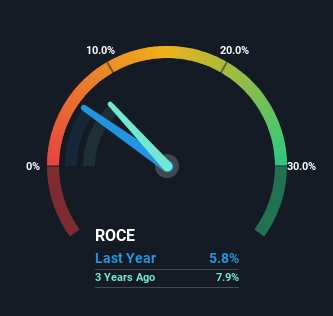- China
- /
- Auto Components
- /
- SHSE:603788
Ningbo Gaofa Automotive Control System (SHSE:603788) Will Be Hoping To Turn Its Returns On Capital Around
To avoid investing in a business that's in decline, there's a few financial metrics that can provide early indications of aging. When we see a declining return on capital employed (ROCE) in conjunction with a declining base of capital employed, that's often how a mature business shows signs of aging. This indicates to us that the business is not only shrinking the size of its net assets, but its returns are falling as well. And from a first read, things don't look too good at Ningbo Gaofa Automotive Control System (SHSE:603788), so let's see why.
Understanding Return On Capital Employed (ROCE)
If you haven't worked with ROCE before, it measures the 'return' (pre-tax profit) a company generates from capital employed in its business. The formula for this calculation on Ningbo Gaofa Automotive Control System is:
Return on Capital Employed = Earnings Before Interest and Tax (EBIT) ÷ (Total Assets - Current Liabilities)
0.058 = CN¥116m ÷ (CN¥2.3b - CN¥343m) (Based on the trailing twelve months to September 2023).
So, Ningbo Gaofa Automotive Control System has an ROCE of 5.8%. In absolute terms, that's a low return but it's around the Auto Components industry average of 6.6%.
See our latest analysis for Ningbo Gaofa Automotive Control System

Historical performance is a great place to start when researching a stock so above you can see the gauge for Ningbo Gaofa Automotive Control System's ROCE against it's prior returns. If you're interested in investigating Ningbo Gaofa Automotive Control System's past further, check out this free graph covering Ningbo Gaofa Automotive Control System's past earnings, revenue and cash flow.
What Can We Tell From Ningbo Gaofa Automotive Control System's ROCE Trend?
There is reason to be cautious about Ningbo Gaofa Automotive Control System, given the returns are trending downwards. About five years ago, returns on capital were 15%, however they're now substantially lower than that as we saw above. On top of that, it's worth noting that the amount of capital employed within the business has remained relatively steady. Companies that exhibit these attributes tend to not be shrinking, but they can be mature and facing pressure on their margins from competition. If these trends continue, we wouldn't expect Ningbo Gaofa Automotive Control System to turn into a multi-bagger.
Our Take On Ningbo Gaofa Automotive Control System's ROCE
All in all, the lower returns from the same amount of capital employed aren't exactly signs of a compounding machine. Investors must expect better things on the horizon though because the stock has risen 1.6% in the last five years. Either way, we aren't huge fans of the current trends and so with that we think you might find better investments elsewhere.
On a final note, we found 3 warning signs for Ningbo Gaofa Automotive Control System (2 are concerning) you should be aware of.
While Ningbo Gaofa Automotive Control System may not currently earn the highest returns, we've compiled a list of companies that currently earn more than 25% return on equity. Check out this free list here.
Valuation is complex, but we're here to simplify it.
Discover if Ningbo Gaofa Automotive Control System might be undervalued or overvalued with our detailed analysis, featuring fair value estimates, potential risks, dividends, insider trades, and its financial condition.
Access Free AnalysisHave feedback on this article? Concerned about the content? Get in touch with us directly. Alternatively, email editorial-team (at) simplywallst.com.
This article by Simply Wall St is general in nature. We provide commentary based on historical data and analyst forecasts only using an unbiased methodology and our articles are not intended to be financial advice. It does not constitute a recommendation to buy or sell any stock, and does not take account of your objectives, or your financial situation. We aim to bring you long-term focused analysis driven by fundamental data. Note that our analysis may not factor in the latest price-sensitive company announcements or qualitative material. Simply Wall St has no position in any stocks mentioned.
About SHSE:603788
Ningbo Gaofa Automotive Control System
Ningbo Gaofa Automotive Control System Co., Ltd.
Excellent balance sheet established dividend payer.
Market Insights
Weekly Picks


Crazy Undervalued 42 Baggers Silver Play (Active & Running Mine)


Fiducian: Compliance Clouds or Value Opportunity?

Willamette Valley Vineyards (WVVI): Not-So-Great Value
Recently Updated Narratives

Watch Pulse Seismic Outperform with 13.6% Revenue Growth in the Coming Years

Significantly undervalued gold explorer in Timmins, finally getting traction

Moderation and Stabilisation: HOLD: Fair Price based on a 4-year Cycle is $12.08
Popular Narratives


MicroVision will explode future revenue by 380.37% with a vision towards success


NVDA: Expanding AI Demand Will Drive Major Data Center Investments Through 2026





